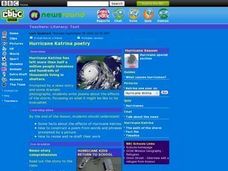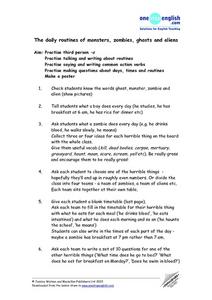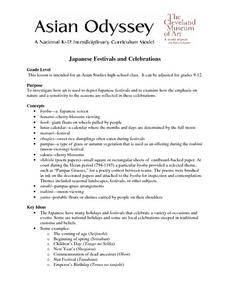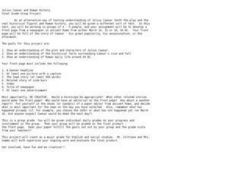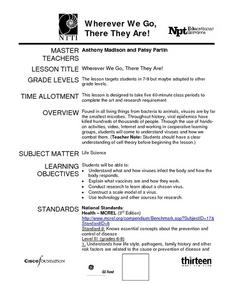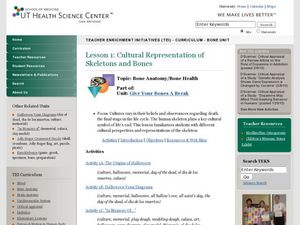Curated OER
The Renaissance Person: composing an Extended Definition Essay
Students recognize the characteristics of an extended definition. In this Renaissance person lesson, students read a collection of short stories. Students research the definitions of Renaissance and Renaissance person. ...
Curated OER
Lesson Plan to Accompany Psalm of Life
Students read and analyze the poem, "Psalm of Life," by Henry Wadsworth Longfellow. They create a Footsteps Quilt, developing quilt squares to represent each goal and gift they would leave as a gift to humanity.
Curated OER
Home of the Brave
Pupils use various types of people and the special places they each call home. They discover houses, like the world, are always changing. Students start out by brainstorming what was the one thing that made a house a home. They were read...
Curated OER
Writing an Eyewitness Account
Students write an eyewitness account of an unexpected event. They decide on the relevant events to include in the write up. They determine the importance of writing up accurate accounts and reports for jobs such as police officers.
Curated OER
Dealing With Tragedy in the Classroom
Young scholars compose a letter, organize a group effort, discuss the idea of patriotic symbols and explain their importance, use visual representations to express feelings and explain the importance of sustained volunteerism.
Curated OER
"We Remember" Eulogy Project
Eighth graders complete a culminating project on the Holocaust. In this eulogy instructional activity, 8th graders use information gathered from previous research and create a poster about the Holocaust. Students make a presentation...
Curated OER
Hurricane Katrina Poetry
Learners write poems about the effects of a storm. Students study on what it might be like to be excavated. Learners explore on how to revise and re-draft their work. Students construct a poem from words and phrases prompted by a picture.
Curated OER
Taking Pills Isn't the Answer
Students explore performance-related drug use. For this health journalism lesson, students read the USA Today article titled "Taking Pills Isn't the Answer", respond to discussion questions regarding the article, and complete...
Curated OER
"In Flanders Fields" by John McCrae
Pupils read the poem "In Flanders Fields" by John McCrae. In this poetry lesson, students read the poem on an overhead transparency and discuss what actions can be used to illustrate it. Pupils come up with their own movements to...
Curated OER
Cockney English
Ninth graders examine a form of English called Cockney. In this English lesson, 9th graders read an article and answer reading comprehension questions. Students participate in an online quiz.
Curated OER
Literature for Lesson 4 - Abolitionists
Learners examine the definition of abolition and abolitionists. In this abolition lesson, students complete vocabulary work before reading about Harriet Tubman, Sojourner Truth, and Frederick Douglass. They watch a video about Harriet...
Curated OER
Change slander to remorse: Unscripted Scenes
Students hypothesize about the content of unscripted moments, search for evidence in the actual text to support their hypothesis, and explore how this hypothesis would affect characterization.
Curated OER
The Daily Routines of Monsters, Zombies, Ghosts and Aliens
Students practice writing and speaking about routines and using action verbs. Students create a poster based on their writing about monsters and zombies.
Curated OER
Japanese Festivals and Celebrations
Students investigate the importnce of celebrations anf festivals in Japanese culture and then create a story based upon an image from the lesson. Resource links are provided for images of events.
Curated OER
Julius Caesar and Roman History
Students write a front page of a newspaper from Ancient Rome dated March 14, 15, 16. 44BC that explains the role of Julius Caesar. They complete is assessment assignment in groups.
Curated OER
Scientific Advances Could Bring Back the Dodo & Mammoth
Students reflect on the possibility of bringing extinct species back to life. For this ESL lesson, students debate the pros and cons of extinction reversal then complete several activities centered around the topic.
Curated OER
The Witch of Goingsnake
Students listen to The Ballad of Ira Hayes and write paragraphs about his character. In this The Witch of Goingsnake lesson, students read the verses and chorus of the ballad aloud and make notes about Ira Hayes. Students write a...
Smithsonian Institution
Dia de los Muertos: Honoring our Ancestors Through Community Celebration
Oral storytelling has been an important part of every culture. The time-honored practice uses stories as a conduit for a culture's values and customs from one generation to the next. Keep the tradition going with a family interview...
Curated OER
Mystic Lands: Maya: Messages in Stone
Students explore an ancient Mayan city. In this world history lesson, students watch a video about the ancient Mayan civilization, discussing information prior to and after watching the video. Students then come to understand more about...
Forest Foundation
The Nature of Trees
Young botanists examine the different parts of tress and then draw parallels between the functions of these parts and the function of parts of the human body.
Curated OER
Wherever We Go, There They Are!
The central video for this lesson is not available through the included resource link. However, the activity that simulates the passing of a virus through a population is impacting and the other resource links are invaluable. Use this...
Curated OER
Cultural Representation of Skeletons and Bones
Eighth graders study cultures and beliefs about the final life cycle. In this culture lesson students complete several activities on the origins of Halloween.
Curated OER
Learning About Guatemala Through Its Kites
Students are introduced to Guatemala and to the tradition of giant kites. They decorate the kite sail and construct the kite. Students identifies possible causal factors contributing to given historical events.
Curated OER
Forward, Into the Past!
Young scholars, during a (virtual) visit to a burial ground, think about the past by viewing tombstones as primary sources. They explain how the attitudes of Deerfield residents toward death and burial evolved from 1780-1880.








